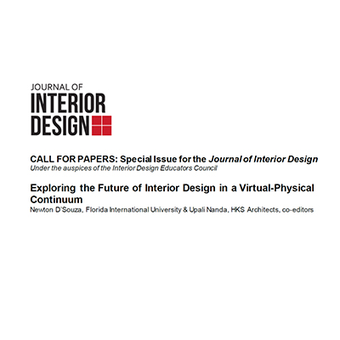Register
Event Details
Exploring the Future of Interior Design in a Virtual-Physical Continuum
Newton D’Souza, Florida International University & Upali Nanda, HKS Architects, co-editors
Registration of Interest Due: April 1, 2021
Full Submissions Due: January 1, 2022
Final Submissions to Publisher: October 2022
Publication: March 2023
Conventionally, places are characterized by physical features (i.e., furniture layout, quality of daylighting, etc.) and behaviors of people who occupy them (i.e., eating, meeting friends, etc.). The advent of virtual technologies (computers, Internet-of-things, etc.) and the social distancing behaviors adopted during the pandemic (Zoom meetings, remote learning) have changed our conventional sense of place. While virtual technology has disrupted our traditional behaviors in corresponding physical locations, it has also transformed virtual experiences such as online shopping, remote work, tele worship, telemedicine, home Yoga, home entertainment, virtual happy hours, and home-schooling among others. Lori Kendall argues that virtual behaviors have the capacity to induce particularly vivid sense of place, and that in our virtual engagement, there is the potential of two experiential worlds of virtual and physical to co-exist simultaneously. Nevertheless, our traditional affinity of conducting behaviors in their corresponding physical locations has raised questions of authenticity of virtual behaviors. For instance, Sherry Turkle, argues that in virtual environments, people are merely "pretending" to be in a "real" place while they sit at their computer screens, much like people pretend to be at a "real" French café while dining in Disneyland.
Transcending the virtual versus physical debate, this special issue challenges scholars to explore a continuum of place experiences between the two. Terming it as a virtual-physical continuum, the special issue challenges scholars to ask critical questions on the role of technology in the continuum of place experience and its implication to the future of interior design.
This special issue invites visual essays, research papers, teaching articles, and case studies that explore the potential for technology as it relates to interiors. Possible submissions might engage with the following issues:
- What are the emerging typologies in interior design that exemplifies places in the virtual-physical continuum? How can they be measured and studied (for e.g., Buy online, pick up in-store- BOPIS)?
- How has digital media disrupted or transformed place experiences, especially in the era of social distancing that demands remote work and school (for e.g., the blending of places such as home (“first place”), workplace (“second place”), and cafes (“third place”)?
- How will the role of touch alter our interaction of physical spaces (for e.g., the use of sensor technologies and robotics to reduce touch points in hospitality environments)?
- How have tools such as internet-of-things and instant digital connectivity changed traditional place experiences (for e.g., transformation in home environments brought about by smart technology)?
- How can technology facilitate adaptive reuse strategies (for e.g., transformation of hotel-to-healthcare models)?
Submissions should expand and question our conventional understandings of the topic and its complex relationships to interior space.
All work must demonstrate exceptional rigor in the search for new knowledge and ideas. Papers must be original work of the author or authors and are not being considered for publication in other journals. Submissions may be checked for originality using plagiarism-detection software.
DUE DATES FOR SPECIAL ISSUE:
- April 1, 2021 Registration of Interest – Authors are asked to register their intent to submit a paper by sending a 150-word abstract to Newton D’Souza at ndsouza@fiu.edu. Please put your surname and “JID Special Issue” in the subject line. Registration of interest is not refereed, nor is it a requirement to submit. However, the acknowledgement of registration facilitates development of a proposal to full research paper by providing confirmation of fit with the special issue. Recognition of fit does not guarantee publication.
- March 2023 Publication of JID Special issue
For questions regarding the call for papers, submission deadlines, or anything related to the content of the Special Issue contact Newton D’Souza at ndsouza@fiu.edu. Please put your surname and “JID Special Issue” in the subject line.


